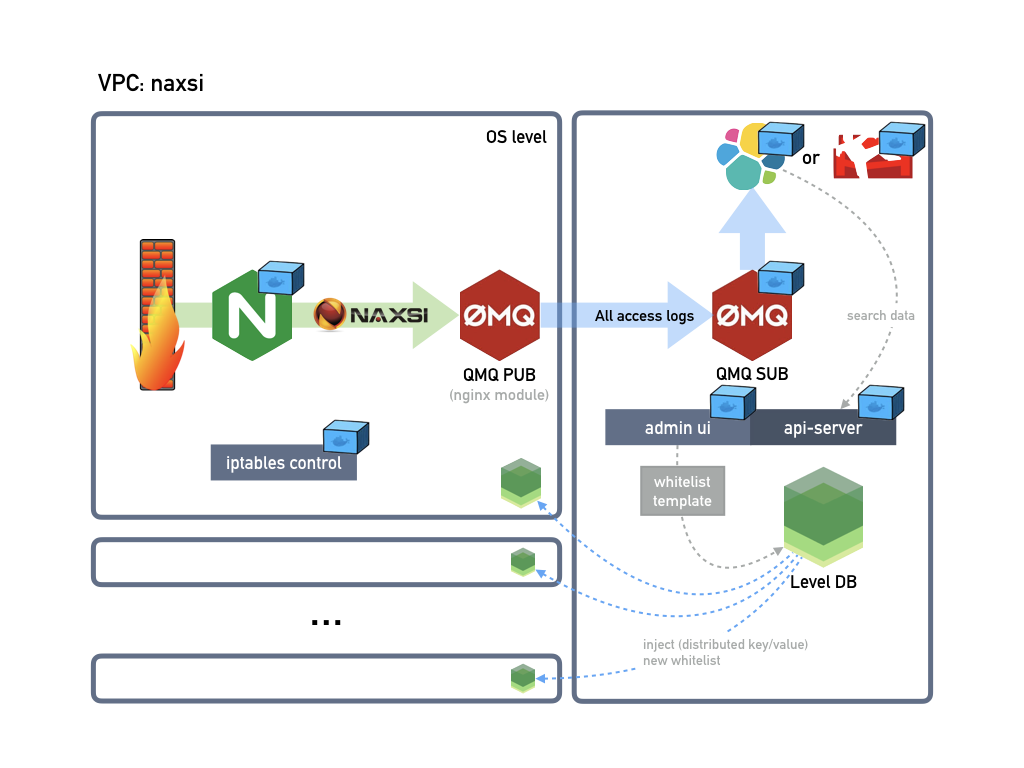nginx-naxsi (port:81)
\_ /etc/nginx/nginx.conf --- proxy_pass to wordpress --- wordpress(port: 8080) + mariadb
\_ /var/log/error.log
\_ naxsi_core.rule
\_ nxapi/nxapi.json (configure elastic search)
nginx-zmq-log
\_ /etc/nginx/nginx.conf --- `log_zmq_server thorn-zmq-sub:5556`
thron-ui (not ready yet)
thorn-zmq-sub (port:5556)
thorn-netfilter (blank: 80, netfilter api: 8082, dummy web server: 9000)

|

|

|
Please skip this step, if you do not run naxsi with nginx on your host OS
$ export DOCKER_HOST=10.40.219.150:2376 // test01
Please skip this step too, if you do not run naxsi with nginx on your Virtual OS
$ make create-machine
$ docker-machine ip naxsi-test-env
NAME ACTIVE DRIVER STATE URL SWARM DOCKER ERRORS
naxsi-test-env - virtualbox Running tcp://192.168.99.100:2376 v1.12.4
$ export DOCKER_HOST=192.168.99.100:2376 // vm$ docker run -e MYSQL_ROOT_PASSWORD=wordpress -e MYSQL_DATABASE=wordpress --name wordpressdb -v "$PWD/db":/var/lib/mysql -d mariadb:latest
$ docker run -e WORDPRESS_DB_PASSWORD=wordpress --name wordpress --link wordpressdb:mysql -p 8080:80 -v "$PWD/html":/var/www/html -d wordpress
//or
$ make run-blog$ make build
$ make run-naxsi$ curl "http://10.40.219.150/?a=<"$ docker pull elasticsearch
$ docker run -dit --name elasticsearch -p 9200:9200 -p 9300:9300 elasticsearch
// or
$ make run-elastic
// create elastic search index and test call
$ curl -X GET http://localhost:9200
$ curl -X PUT http://localhost:9200/nxapi$ ./nxtool.py -c nxapi.json --files=/var/log/nginx/localhost_error80.log$ curl -X POST "http://10.40.219.150:9200/nxapi/events/_search?pretty" -d {}I want to generate whitelists for 10.40.219.150, so I will get more precise statistics first
$ ./nxtool.py -c nxapi.json -s 10.40.219.150 -f
$ ./nxtool.py -c nxapi.json -f --slack --colors | grep BasicRule
$ ./nxtool.py -c nxapi.json -f --slack --colors | grep BasicRule > /etc/nginx/custom.rulesIf you get the memory issue of elastic search container inside vm please see this QA
max virtual memory areas vm.max_map_count [65530] is too low
$ sysctl -w vm.max_map_count=262144If fielddata issue is happen with newest Elastic Search, when nxtool generate whitelist.
You should patch it as follow
PUT ~/nxapi/_mapping/events
{
"properties": {
"id": {
"type": "text",
"fielddata": true,
"fields": {
"keyword": {
"type": "keyword",
"ignore_above": 256
}
}
}
}
}
Configure: removed the --with-ipv6 option. IPv6 now compiled-in automatically if support is found. If there is a need to disable it for some reason, --with-cc-opt="-DNGX_HAVE_INET6=0" can be used for this.
To compile a third-party module that has been converted, use the new --add-dynamic-module argument and specify the path:
As with NGINX modules, a shared object is created and installed in the modules subdirectory, and you add a load_module directive for it to the NGINX configuration. Our developer relations team is available to assist with converting a module. Contact us via the NGINX development mailing list.
ngx_zmq_log module doesn't work well with nginx. There is no problem, when it's compiled with nginx. But it's not run cause of dlopen: undefined symbol ngx_zmq_log
./configure --conf-path=/etc/nginx/nginx.conf \
--add-dynamic-module=../nginx-log-zmq-master \
--with-ld-opt="-lzmq"
http {
log_zmq_server main 172.17.0.4:5556 tcp 4 1000; # required
log_zmq_endpoint main ""; # required
log_zmq_format main '{"remote_addr":"$remote_addr", "remote_user":"$remote_user",'
'"request":"$request", "status":"$status",'
'"body_bytes_sent":"$body_bytes_sent",'
'"http_referer": "$http_referer", "http_user_agent":"$http_user_agent",'
'"http_x_forwarded_for": "$http_x_forwarded_for",'
'"time_local":"$time_local"}'; # required
}
- https://github.com/colstrom/docker-nginx-naxsi
- http://stackoverflow.com/questions/40078424/how-could-i-run-nginx-naxsi-in-baseimage
- http://qiita.com/jey0taka/items/ee170239b242fc77887a
- https://github.com/nbs-system/naxsi/tree/master/nxapi
- https://www.nginx.com/resources/wiki/modules/log_zmq/#log-zmq-installation
- http://bravenewgeek.com/a-look-at-nanomsg-and-scalability-protocols/

